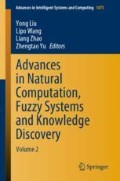Abstract
As one of the most important building materials, the quality of concrete directly affects the safety of buildings. Hence, it is an important and hot issue to predict the compressive strength of concrete with highly accuracy. Most of existing methods heavily depend on building a single model to predict the compressive strength of concrete. However, the proposed single models are not one-size-fits-all, different model have different limitations, making them a better or worse fit for different situation. To address this issue, this paper proposes a novel predict model for concrete compressive strength based on ensemble learning method. In detail, we build our ensemble framework via using the AdaBoost method, while the random forests methods as weak classifier are integrated to the AdaBoost framework. For dealing with the noisy and missing value problems, a set of statistical methods are employed. Furthermore, we utilize the Pearson correlation coefficient to analysis the relationship between different input materials, which can effectively drop out the irrelevant and redundant features. Experimental results on two industrial data sets show that proposed ensemble estimator can significantly improve the prediction accuracy in comparing with other five state-of-the-art methods.
Access this chapter
Tax calculation will be finalised at checkout
Purchases are for personal use only
References
Wang, D., Chen, Z.: On predicting compressive strengths of mortars with ternary blends of cement, GGBFS and fly ash. Cem. Concr. Res. 27(4), 487–493 (1997)
Popovics, S.: History of a mathematical model for strength development of Portland cement concrete. Mater. J. 95(5), 593–600 (1998)
Rougeron, P., Aïtcin, P.C.: Optimization of the composition of a high-performance concrete. Cem. Concr. Aggreg. 16(2), 115–124 (1994)
Yeh, I.C.: Modeling of strength of high-performance concrete using artificial neural networks. Cem. Concr. Res. 28(12), 1797–1808 (1998)
Nguyen, T., Kashani, A., Ngo, T., et al.: Deep neural network with high-order neuron for the prediction of foamed concrete strength. Comput.-Aided Civil Infrastruct. Eng. 34(4), 316–332 (2019)
Deng, F., He, Y., Zhou, S., et al.: Compressive strength prediction of recycled concrete based on deep learning. Constr. Build. Mater. 175, 562–569 (2018)
Breiman, L.: Random forests. Mach. Learn. 45(1), 5–32 (2001)
Schapire, R.E.: The strength of weak learnability. Mach. Learn. 5(2), 197–227 (1990)
Freund, Y., Schapire, E.R.: A desicion-theoretic generalization of on-line learning and an application to boosting. Computational Learning Theory (1995)
Gandomi, A.H., Alavi, A.H.: A new multi-gene genetic programming approach to nonlinear system modeling. Part I: materials and structural engineering problems. Neural Comput. Appl. 21(1), 171–187 (2012)
Chou, J.S., Pham, A.D.: Enhanced artificial intelligence for ensemble approach to predicting high performance concrete compressive strength. Constr. Build. Mater. 49, 554–563 (2013)
Chou, J.S., Chiu, C.K., Farfoura, M., et al.: Optimizing the prediction accuracy of concrete compressive strength based on a comparison of data-mining techniques. J. Comput. Civil Eng. 25(3), 242–253 (2010)
Acknowledgement
This work was supported in part by Chongqing research program of key standard technologies innovation of key industries under grant cstc2017zdcy-zdyfX0076, in part by Chongqing research program of technology innovation and application under grant cstc2018jszx-cyztzxX0025 and cstc2017rgzn-zdyfX0020, in part by Youth Innovation Promotion Association CAS, No. 2017393, in part by the National Natural Science Foundation of China under Grant 61602434.
Author information
Authors and Affiliations
Corresponding author
Editor information
Editors and Affiliations
Rights and permissions
Copyright information
© 2020 Springer Nature Switzerland AG
About this paper
Cite this paper
Lv, Y., Shi, X., Ran, L., Shang, M. (2020). Random Forest-Based Ensemble Estimator for Concrete Compressive Strength Prediction via AdaBoost Method. In: Liu, Y., Wang, L., Zhao, L., Yu, Z. (eds) Advances in Natural Computation, Fuzzy Systems and Knowledge Discovery. ICNC-FSKD 2019. Advances in Intelligent Systems and Computing, vol 1075. Springer, Cham. https://doi.org/10.1007/978-3-030-32591-6_60
Download citation
DOI: https://doi.org/10.1007/978-3-030-32591-6_60
Published:
Publisher Name: Springer, Cham
Print ISBN: 978-3-030-32590-9
Online ISBN: 978-3-030-32591-6
eBook Packages: Intelligent Technologies and RoboticsIntelligent Technologies and Robotics (R0)

